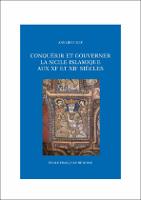Conquérir et gouverner la Sicile islamique aux XIe et XIIe siècles
Author(s)
Nef, Annliese
Collection
Knowledge Unlatched (KU)Language
FrenchAbstract
Conquering Sicily from the middle of the XIth century, Hauteville are the first to set up a government that is defined as a Christian and, at least in part, from Latin, while exercising its prerogatives at a predominantly Muslim population, Arabic speaking. To do this, they gradually developed instruments of government, but also became the patrons of a cultural production that has aroused admiration and comments until today.
This work is presented as an investigation into the different dimensions of the power of Hauteville from the conquest of Sicily at the end of the 12th century (language policy, state building, patronage, but also control of populations and territory). It aims to demystify the representations that we often have of this long century of "tolerance", but also to deconstruct the idea that the failure of the dynasty was written in advance. He nevertheless postulates that the “Norman” construction in Sicily remains original and innovative and that it provides useful elements of comparison for all those who analyze situations of conquest and minority government in a multicultural context.
Keywords
History; Europe; ItalyDOI
https://doi.org/10.4000/books.efr.5336ISBN
9782728313600Publisher website
http://www.publications.efrome.it/opencms/opencms/?locale=enPublication date and place
2019Grantor
Imprint
École française de RomeClassification
European history


 Download
Download